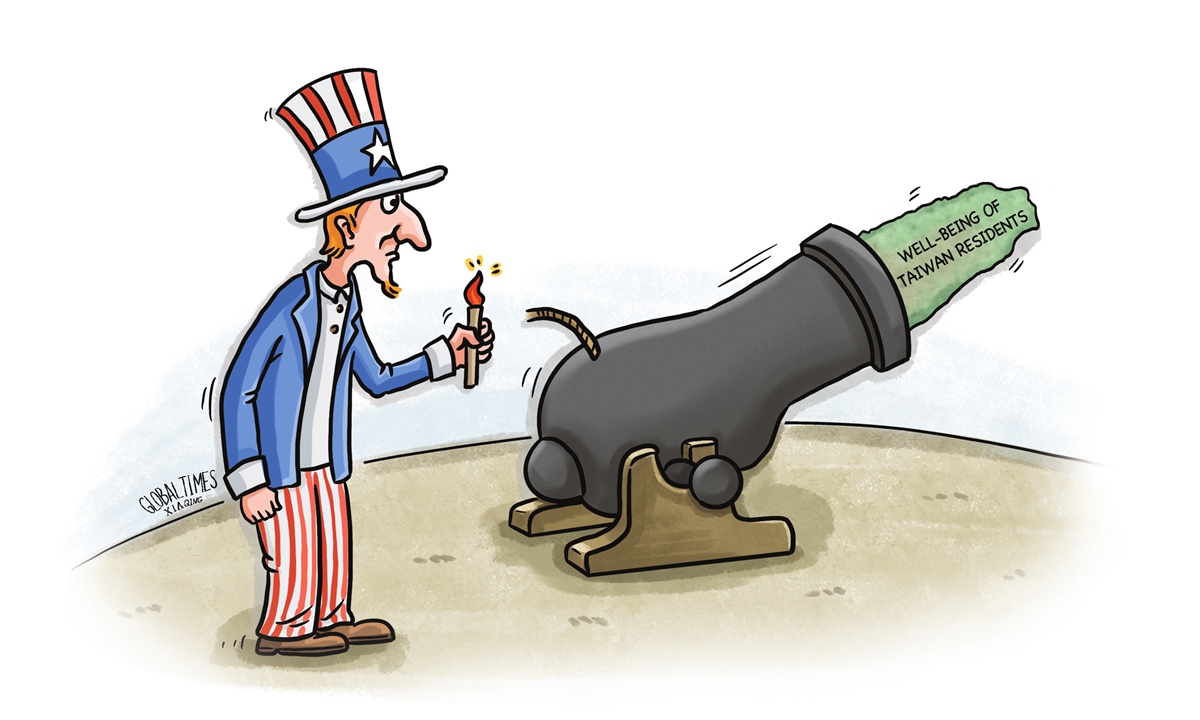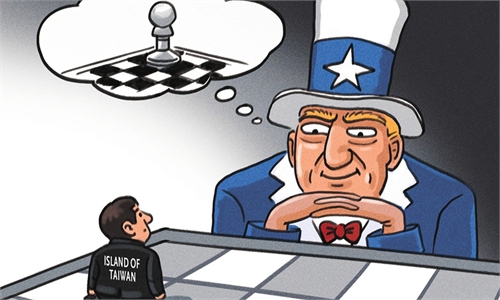
Illustration: Xia Qing/GT
Oceans away from the US and just across a strait from the Chinese mainland lies Taiwan, an island long recognized by the US and the international community as part of China. This is written in black and white in UN General Assembly Resolution 2758 and fundamental bilateral documents between 182 countries and China that mark the beginning of their diplomatic relations. With such international consensus, the waters of the Taiwan Straits have stayed calm for decades.
In recent years, however, the US has been secretly and publicly backtracking on the commitments it made to China in the three joint communiqués. It is even trying to cross the red line of China's sovereignty and territorial integrity, disrupting the very foundation of US-China relations.
US naval vessels constantly sail through the Taiwan Straits, making waves and flexing muscles. The US has made more than 110 rounds of arms sales to Taiwan since it severed its so-called "diplomatic ties." The Pentagon has sent a hundred and more military officers to the island to train young Taiwan residents and improve its so-called "self-defense build-up." Last August, then Speaker Nancy Pelosi, third-highest ranking US official, made an official visit to Taiwan on a military aircraft in direct violation of the US pledge to maintain only unofficial relations with the island. Last month, House Speaker Kevin McCarthy met with the incumbent Taiwan regional leader Tsai Ing-wen, setting another bad example.
Why does the US call on others to maintain peace across the Straits while arming Taiwan to the teeth for a war that only exists under its self-fulfilling prophecies? Why does the US pay lip service to its "one China" policy while having its top diplomats change their tune and lard their talking points with harsh expressions like "global issue" or "international concern," making this issue a matter of concern for the whole world? Most fundamentally, why has the US changed its attitude toward the Taiwan question?
Although the US never practiced what it preached, this is something more than a simple slippery slope into a bad habit. A peaceful home-coming of Taiwan to the motherland and the well-being of people from both sides of the Straits have never been in the interest of the US, which hardly cares if all those young men from Taipei or Kaohsiung turn into cannon fodder in a hot war it would intentionally trigger. For the US, Taiwan island is nothing but a strategic pawn to contain China, a country that it more and more regards as a challenge to its hegemony.
At the same time, the US knows only too well that "Taiwan independence" is a mirage that will inevitably shatter when facing the Chinese resolve for national reunion. To serve its own purpose, it must exhaust all means to gain as much leverage as possible. So it sold to its close allies the idea that what happened across the Straits is not China's own problem, but a plight where a helping hand from outside is desperately needed. With a bit of luck, someone did buy this sheer fallacy. Mr. Yoon Suk-yeol, the South Korean president, for example, repeated the US line to please its Big Brother, in the same way as he sang at the most expensive "karaoke" during his tour to the US to please his audience.
US diplomatic jargon and narrative may be misleading, but facts and logic aren't. Since Taiwan is part of China, there is no way that China would "invade" Taiwan. Since it is within China's sovereignty to handle the Taiwan question, it is up to China to decide how to put the final piece of the puzzle back in place, not anyone else. Since this issue has always been a family affair, the worrisome "international society" has no reason to interfere. The US needs to come to its senses. The sooner it drops the "dual deterrence" and returns to its one-China commitment, the better it is for a healthy and stable China-US relationship.
For the younger generation of people in Taiwan, "it is your choice to choose between peace and war for our future," said Ma Ying-jeou, Taiwan's former regional leader, who visited the mainland when Tsai landed in the US. To return to the big family will offer more opportunities than being manipulated as a puppet. For those who really care about the island, it is helpful to know that the US-Taiwan relationship is not so much patron-client as it is a bully-victim relationship. A good resolution of the Taiwan question is one that serves the fundamental interests of the ordinary people in Taiwan.
So, no need to waste money on a losing bet any more.
The author is a commentator on international affairs, writing regularly for Global Times, China Daily etc. He can be reached at xinping604@gmail.com.

